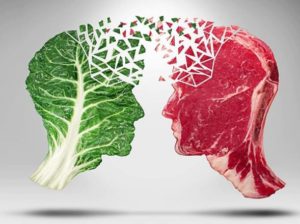 ヴィーガニズムとは、絶対菜食主義のことで、動物製品の使用を一切行わない生活様式です。ヴィーガニズムを巡る論争について考えます。
ヴィーガニズムとは、絶対菜食主義のことで、動物製品の使用を一切行わない生活様式です。ヴィーガニズムを巡る論争について考えます。
Introduction
Veganism is a controversial issue with strong opinions in favour and against. However, these opinions are less based on facts than you might think. What are they based on? And how can we convince someone to change an opinion?
初めに
ヴィーガニズムは、賛成派も反対派もそれぞれが強い意見を戦わせるテーマです。しかし、その意見は一般に考えるよりも事実を基にしていません。それでは、何に基づいているのでしょう。また、どのように相手に意見を変えるよう説得できるのでしょうか。
Veganism – that’s not eating or using any products that come from animals – may be more than a fad. It could be a lifestyle that improves our health and the planet. And it could be here to stay. In this programme we’ll be discussing the debate about veganism and how it’s sometimes difficult to change people’s minds.
ヴィーガニズム ―― 動物由来の製品を食べない、使わない主義 ―― は一時的な流行を超えるものかもしれません。また私たちの健康と地球を改善するライフスタイルかもしれません。望めばそれに乗ることもできるでしょう。この番組が議論するのは、ヴィーガニズムについてのデベート、並びに人々の心を変えることが時に難しい問題であることです。
According to some national surveys, there are now around 3.5 million full-time vegans in the UK… and the number is growing! And what was recently a radical lifestyle choice is slowly moving into the mainstream – or has become accepted by most people as normal.
ある全国調査によると、現在英国には約350万人の本格的ヴィーガンがおり、なんとその数は増えているのです。最近急進的なライフスタイルを選択する人が徐々に主流となる層に流れ込んでいます。あるいは抵抗なくほとんどの人に受け入れられるようになっています。
Advocates of veganism say their healthy lifestyle would also free up space and resources for growing food and it would help reduce greenhouse gas emissions. But having a meat-free diet means you might not get all the nutrients you need.
ヴィーガニズム提唱者が言うには、その健康的なライフスタイルが食料を育てるためのスペースと資源の活用余地を広げるとともに温室効果ガスの排出を減らすのに役立つのです。しかし、肉なしの食事ではある意味で必要なすべての栄養素が得られないかも知れません。
This is all part of the debate. There’s always two sides to an argument and it’s something that’s been discussed on BBC Radio 4’s Farming Today programme. They spoke to Dr Jutta Tobias Mortlock, a senior lecturer in organisational psychology at London’s City University, who explained why views about veganism are so polarised – that ‘means causing people to divide into two groups with opposing views’.
これはすべて議論の一部です。議論には常に2つの側面があり、BBC Radio 4のFarming Todayプログラムで議論されているものです。ロンドンのシティ大学の組織心理学の上級講師であるユタ・トビアス・モートロック博士から話をお聴きします。博士はヴィーガニズムに関する見解が非常に偏っているいるために、それぞれ反対の意見を持つ二つのグループに分裂してしまう理由を説明しています。
Dr Jutta Tobias Mortlock
This issue touches on personal beliefs, and beliefs always trump facts and so, often when we talk about beliefs, we’re touching on important values. Values are the things that guide our opinion over what’s right versus what’s wrong. And so whenever people argue over whether it’s right or wrong to eat meat, they are in fact not debating the facts around this issue, they’re actually debating the beliefs about what’s moral or immoral about this.
ユタ・トビアス・モートロック博士
この論点は個人の信念に触れています。信念は常に事実に勝るので、しばしば信念について話すとき、私たちは重要な価値観に触れるのです。価値観は、「正しいこと」対「悪いこと」に関して自分の意見を導くものです。したがって、肉を食べることが正しいか間違っているかを議論するときはいつでも、実際にこの論点を取り巻く事実でなく、道徳的または不道徳的であるという自分の思いを議論しているに過ぎないのです。
According to Dr Jutta, there are two main routes to winning someone over: a direct, fact-based approach or a ‘peripheral route’, which might be more effective. Let’s hear her explain how it works.
博士によれば、誰かを論破するための2つの主要な方法があります。直接的な事実に基づくアプローチと、より効果的かもしれない「周辺経路」です。それがどのように機能するかを博士の説明を聞いてみましょう。
Dr Jutta Tobias Mortlock
If I’m working with you and I’m trying to get you to come round to my side, I might not focus on the central facts. I might focus on the peripheral stuff around how I’m constructing my argument. I’d look for ways of how they overlap as people, like what do they have in common? And that’s a way to debate an issue such as this controversial one in a way to get people to feel connected to each other and to actually feel that they value each other as decent human beings.
ユタ・トビアス・モートロック博士
あなたと一緒に働いていて、あなたを私の側に来させようするならば、私は中心となる事実に焦点を当てないかもしれません。むしろ自分の議論を構築している周辺のものに焦点を合わせるかもしれません。なにが共通しているかを問うように、相手方とどのように重なり合うかを探りたいからです。それは、このように物議をかもしている問題を議論する方法の一つです。それによって、お互いにつながっており、お互いがまともな人間として相手を尊重していると感じさせるのです。
- 投稿タグ
- veganism



最近のコメント